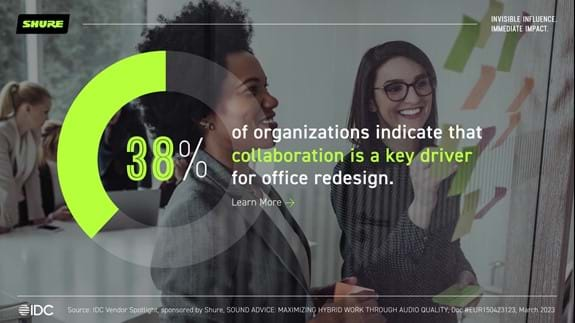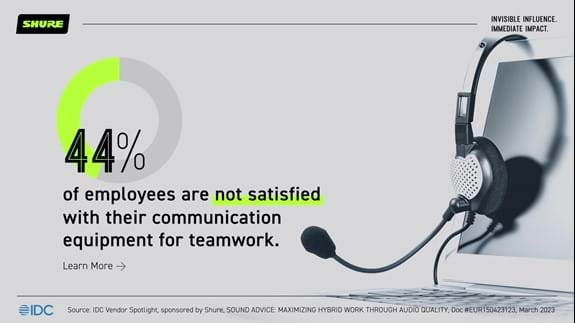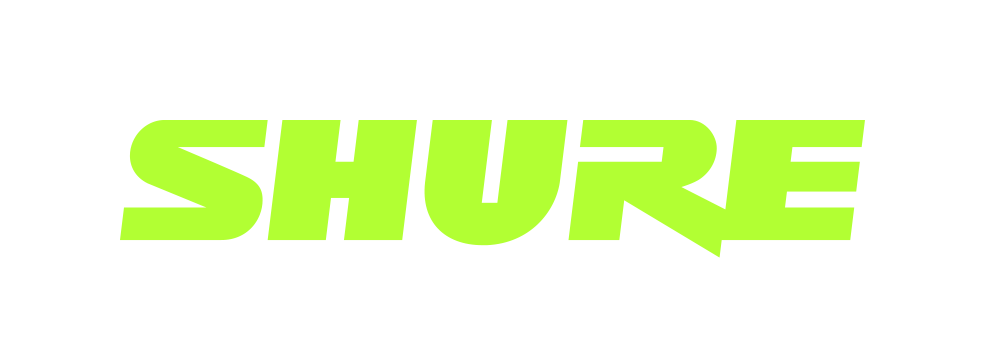Over the past few years, we have experienced a sharp rise in flexible working environments. Long gone are the days of individual cubicle life, as we are no longer confined to a single workstation located in a permanent environment. Today’s new world of hybrid working means that we can work from anywhere! Whether it’s at a company’s headquarters, at home, a coffee shop, or on the road, collaboration and communication between people is vital to enable them to make the best decisions. For many, however, this new working reality is not fully supported.
As employees and managers demand more flexible work modules and schedules, the workspace of the future will need to have the tools and technologies to make virtual meetings easier and more inclusive.
Audio communication is a critical factor to employee collaboration either working or not working. Considering the work paradigm shift of the past three years, the workplace has not kept pace. IDC data suggests that many offices designed in pre-pandemic times are not fit for hybrid work.
How do we connect the pieces so that whether we are on-site, or attending remotely, everyone in the meeting has an equal voice at the table?

According to the latest IDC Future of Work Survey, roughly one in three organizations redefined their workplace in 2022. This is expected to continue throughout 2023 and beyond. 38% of organizations confirmed that collaboration is a key driver for office redesign, together with cost savings and employee retention.
Office space planning is the most important office tech investment. The whole user journey of employees around the workplace is now being reimagined, placing collaboration at the center. Nearly a third of companies are now focusing on smart meeting room management and dedicated collaboration spaces.
IDC research shows that the equipment used in most companies is not optimal. Team members often struggle to achieve a satisfying conversation flow that enables all members to equally contribute to discussions. Remote attendees rarely lead discussions, are often side-lined and do not contribute fully. This can lead to delayed or poorly informed decision making and ultimately a loss of productivity.

This finding is supported by ongoing IDC research that shows that the least satisfactory type of hybrid meeting is that intended for problem solving or decision making.
The greater importance being given to hybrid collaboration, and associated communication challenges, are increasing the demand for tools that ensure meeting equity and ultimately improve productivity.
Considering that 44% of employees are not satisfied with their communication equipment for teamwork, IDC sees an important business case for investments in workplace communication and collaboration technology.
Building a thriving workplace that maximizes collaboration is not only a "nice to have" — a lot more is at stake.
As competition for talent increases, staff turnover and retention have been key challenges in recent years. Not having a sense of belonging was among the top 3 factors indicated by employees as reasons for leaving (51% of employees at a global level). The design of the workplace and the equipment available can have a major impact in increasing such feelings of belonging and so reducing staff turnover.
With hybrid meetings continuing to evolve, the task for the IT department will be to create a space in which the seven people, for example, calling in from home have the same interactive experience as the five people in the conference room. Equal participation and presence are the goal, and the technology needs to seamlessly integrate and include remote workers.
As companies transition to new hybrid models, the success of workplace transformation heavily relies on effective communication. Improving audio quality is a relatively cost-effective way to provide remote participants with higher meeting engagement and enhance their ability to contribute. IDC believes that investments to enhance hybrid meetings through audio quality can lead to tangible business outcomes.

Related Posts
IDC Sound Advice: Maximizing Hybrid Work Through Audio Quality
IDC identify how improved meeting and conferencing audio solutions can help address meeting room challenges.
What is the Purpose of an Office?
Read IDC’s view on the changing roll and environment of the workplace and how implementing good audio can lead to tangible business outcomes